|
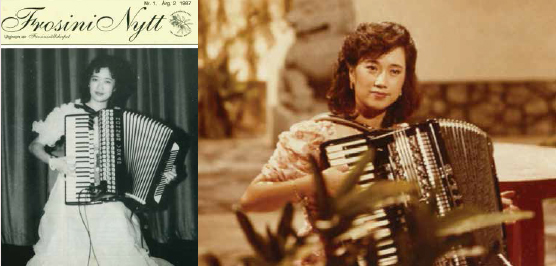
Madam Fang Yuan had a remarkable performing career as an international concert accordionist in the 1980s before founding Singapore’s largest weekend arts school, the Nanyang Academy of Fine Arts’ School of Young Talents in 1999. Meet the woman who drove its success and find out why she feels more can be done towards the nurturing of young talents.
“When I was younger, I was as mischievous as any other child and did not practise the piano as much as I should. I would only do so during piano lessons and my teacher was a nice lady who did not scold me if I did not practise at home. Expectedly I did poorly at one of my auditions, which angered my mother,” revealed Madam Fang Yuan, the founding Principal of Nanyang Academy of Fine Arts’ (NAFA) School of Young Talents, who begun piano study at six.
Those playful days came to an end when her mother hired a strict piano teacher who prepared her well for the audition into the prestigious Secondary Professional Music School affiliated to the Shanghai Conservatory of Music. She was 12 when she was admitted as a piano major.
“The audition was extremely successful. Out of 1,000 candidates, 20 piano students were selected, and I was the only one chosen to perform in the conservatory hall. As a new student, it was a huge honour,” said Madam Fang.
That was when she realised the importance of discipline in the pursuit of musical excellence. Unsurprisingly she now too demands a high level of discipline from her students, which has proven to be the reason for the School of Young Talents’ success in producing exceptional young artists.
From first establishing the NAFA’s Gifted Young Pianists Course in 1991 then the School of Young Talents in 1999, Madam Fang still believes that more can be done to help artistically-gifted children achieve even greater heights.
Becoming an International Concert Accordionist
She may have been originally trained as a pianist but Madam Fang is as adept at playing the accordion as the piano. It was, in fact, an unfortunate turn of events that forced her to master a second instrument.
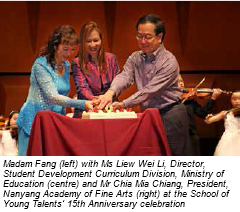 The Cultural Revolution broke out just when she had graduated from the Secondary Professional Music School.
The Cultural Revolution broke out just when she had graduated from the Secondary Professional Music School.
“All western music and instruments were declared to be bourgeois during the Cultural Revolution. It was a difficult time in China. Pianos were either destroyed or sealed. So what instrument could I play to practise my fingers? Only the accordion. It has a keyboard and it was allowed,” explained Madam Fang.
Her dreams of becoming an outstanding pianist came to a halt as she was sent to work in the Navy cultural troupe. Madam Fang recounted how she taught herself to play the accordion during her breaks, “When others were taking afternoon naps, I practised the accordion. I even had to play in the pig sty so I would not disturb those who were taking a nap. It was very smelly but there was nowhere else to go.”
Madam Fang’s solid piano background enabled her to quickly master accordion technique and even rearrange piano scores on the accordion.
In 1973, she heard of an opening in the Shanghai Philharmonic Orchestra and Shanghai Opera House and went for auditions. Her extraordinary piano and accordion performance skills easily won her a spot in both places but she eventually chose the Orchestra.
The concert virtuoso then spent the next decade performing in more than 40 cities throughout China before obtaining her Singapore permanent residency and making the move to Singapore.
“I’ll always remember the day I left — 28 January 1984,” remarked Madam Fang, now a Singapore citizen.
Life in Singapore was vastly different from the one she had in China. Instead of travelling from city to city to perform and appear in media events, she was giving private piano lessons. She even dabbled in television and was a host on a Channel 8 variety show for four months.
“But that was not the life I wanted,” said the accomplished concert artist. “Singapore was a cultural desert in the 80s. Not many knew what an accordion was, much less about its international performing standard. People here have only heard accordion music from buskers performing at underpasses.”
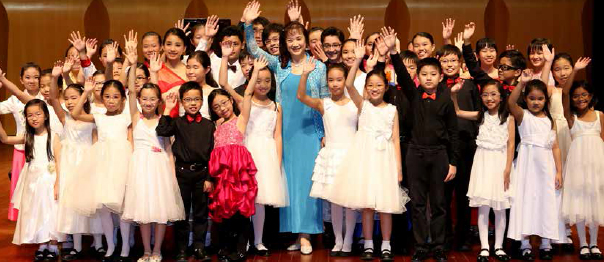
Disappointed, Madam Fang decided to go to the United States to further refine her accordion skills. She visited the Accordions Teachers Association in New Jersey and the Chairman was thoroughly impressed with her playing.
“He was amazed that I picked it up on my own and told me that there was absolutely no need for me to go to a conservatory to learn the accordion but that I had to learn more about its history and theory before he could put me on the jury for international competitions. Of course I jumped at the opportunity so I spent 3 weeks in his school undergoing intensive training,” she recalled.
One of the significant turning points in Madam Fang’s life was when she was a member of the jury for an international competition on the Accordion Fantasy Cruise to Bermuda in 1986.
She had stayed on board to practice the accordion, instead of leaving the ship for a sightseeing tour, when the then President of the American Accordionists’ Association, Mrs Faithe Deffner, overheard Madam Fang practising and immediately invited her to perform at the gala concert.
Madam Fang’s performance received a burst of applause and cheers of “Bravo, China!” from the audience, marking the start of her international concert accordionist career.
She then spent five years travelling around the world, appearing in many major international accordion events in the United States, New Zealand, France, United Kingdom, Italy and Germany, and giving master classes and seminars. Madam Fang also returned to Shanghai for her third recording and to perform with her former orchestra, the Shanghai Philharmonic Orchestra at the Shanghai Concert Hall.
With the numerous invitations to be a jury member for international competitions and to perform on radio and television, Madam Fang was a rising star in the accordion world and was listed in the Cambridge “International Who’s Who in Music and Musicians’ Directory” in 1992/93, “The International Who’s Who of Intellectuals” in 1993/94 and “The Dictionary of International Biography” in 1992.
From International Concert Accordionist to Music Educator
 In 1990, at the peak of her career, Madam Fang made the startling decision to end her professional performing career. She turned down the opportunity to perform at the well-known Moscow Conservatory to accept an invitation to teach piano to diploma-level students at the Nanyang Academy of Fine Arts. In 1990, at the peak of her career, Madam Fang made the startling decision to end her professional performing career. She turned down the opportunity to perform at the well-known Moscow Conservatory to accept an invitation to teach piano to diploma-level students at the Nanyang Academy of Fine Arts.
She explained, “I felt that it was time for me to contribute the rest of my life to society. Sure I could have continued performing but I felt that teaching would be far more fulfilling and impactful.”
Instead of teaching diploma-level students as planned, she proposed the idea of creating a piano programme for musically gifted children to the then Head of NAFA’s music department, Mr Li Lie Gang, citing the lack of such schools.
“As you know learning how to play the piano is a popular pastime among many Singaporean children but many were failing the ABRSM (Associated Board of the Royal Schools of Music) practical examinations then because their foundation was too weak. I heard we even had the highest failure rate in the region,” said Madam Fang.
Knowing the key to building a solid foundation is to begin piano training at a tender age, Madam Fang was not willing to wait for a school for musically gifted children to be built as it would have been a waste of the talent that was already present then.
With Mr Li’s consent, Madam Fang established the Gifted Young Pianists Course and welcomed her first batch of 23 five- to six-year old students in August 1991. Eight years later, the visual arts, drama, dance and music departments in NAFA were brought together under one roof through the inception of the School of Young Talents, and Madam Fang was appointed principal. Under her guidance, the School grew from 1,000 students to 4,700 students.
Today, Madam Fang is both the founding Principal of the School and Head of the Junior Music department.
Committed Faculty
When she first started the Gifted Young Pianists Course, Madam Fang put much thought into choosing her team of teachers as having a good faculty was crucial if she wanted the Course to succeed.
She needed a team who shares the same vision and passion in developing gifted music education in Singapore so when it came down to choosing between qualifications and passion, Madam Fang chose the latter.
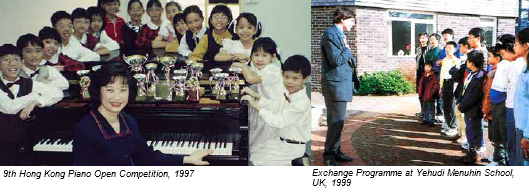
“I need teachers with heart, teachers who are willing to go the extra mile,” explained Madam Fang who eventually picked three of her advanced students to work with her even though she could have hired famous teachers who would draw more students to the Course.
“Although they had no experience in piano teaching and I had to write down the pedalling and fingering for them, we have the same goals and spirit and that’s most important.”
These teachers are still working with her today and are now senior teachers in the School of Young Talents.
Madam Fang also believes that her teachers should never stop learning. She explained, “The world is constantly evolving. We must always improve ourselves so that we’d be ready for any challenge.”
The School now has more than 80 equally qualified and passionate teachers in its Junior Art, Junior Dance, Junior Drama and Junior Music departments.
Rigorous Curriculum
Adding to the School’s success is a curriculum that emphasises on building a strong foundation and discipline.
Unlike full-time students in professional music schools, the School’s students are part-time music students who are saddled with much school work and co-curricular activities (CCA), leaving them with little time to practise.
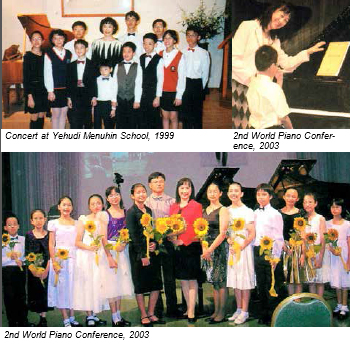 Madam Fang crafts the curriculum to suit the unique profile of her students by prioritising quality over quantity. Madam Fang crafts the curriculum to suit the unique profile of her students by prioritising quality over quantity.
“Although full-time music students have the privilege of learning a wide repertoire, part-time students can also achieve the same quality through a careful selection of repertoire and proper intensive training,” she explained.
In 2003, the Ministry of Education recognised the School and its efforts by awarding CCA points to its students especially those in the gifted music programmes.
Madam Fang has also gone the distance to maintain the high standards of the gifted piano programme by conducting the weekly weekend master class for the last 24 years. These master classes not only provide students with the opportunity to build up their performing experience and confidence, but also allow students, parents and teachers to learn from one another.
Ultimately, when it comes to assessing students, Madam Fang believes in 2 As — ability and attitude. They must demonstrate both an aptitude for music and a willingness to work hard. She also asks that parents sit in for the weekly individual practical lessons and during the practice sessions at home.
With such a well-thought-out curriculum, the students have naturally achieved much success. All students in the gifted piano, violin and cello programmes who sat for the ABRSM practical examinations in 2014 scored distinctions, surpassing its previous record of 97% distinction rate.
Internationally Recognised School
Over the years, the School has churned out music prodigies whom have attracted both national and international praise.
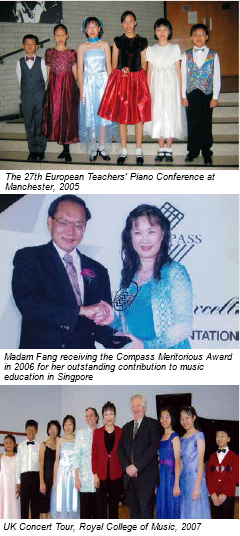 279 students from the Junior Music Department in the School are prize winners, 133 being piano students — of which the majority are students coached by Madam Fang — and the rest cello, violin and Chinese music students. 279 students from the Junior Music Department in the School are prize winners, 133 being piano students — of which the majority are students coached by Madam Fang — and the rest cello, violin and Chinese music students.
Madam Fang fondly remembers how her students won nine first prizes out of their total win of 15 prizes at the 9th Hong Kong Piano Open Competition in 1997. She recalled, “They called us the ‘Singapore typhoon’ because we were the first Singaporeans to have swept right in and picked up those prizes.”
In the same year, her students won all prizes in the junior category at the biannual National Piano and Violin Competition as well, and two years later, they took home all prizes in both the junior and intermediate categories, shocking their competitors. To date, her students have impressively won all prizes in both categories six times.
Many of them also obtain a Grade 8 or an ABRSM diploma before they are 12 years old.
With such astounding achievements, more than 40 of the School’s students have been offered places and scholarships by prestigious music schools in the United States and the United Kingdom such as The Juilliard School, Manhattan School of Music, Eastman School of Music, The Royal College of Music, The Royal Academy of Music, Yehudi Menuhin School, Purcell School, Wells Cathedral School and Chetham’s School of Music.
 “That was how we solidified our brand,” said Madam Fang. “We won many local, regional and international competitions, and participated in international piano conferences and exchange programmes with various music schools.” “That was how we solidified our brand,” said Madam Fang. “We won many local, regional and international competitions, and participated in international piano conferences and exchange programmes with various music schools.”
Her students’ overseas performances have always been well-received. In 1999, their critically-acclaimed performance at the Yehudi Menuhin School brought the house down while their subsequent performance for prominent figures in the music circle in Central London received a standing ovation. In 2007, 14 young pianists and violinists from the School had an immensely successful concert tour in five renowned music schools in the United Kingdom, and in 2012, 11 students from the School were invited to perform and visit the Amadeus International School in Vienna for master classes.
They have also performed at piano conferences. In 2003, 13 of her students were invited by the organiser of the 2nd World Piano Conference to present a concert in Slovenia. Because of their excellent piano technique, their performance was recorded and made into a DVD that was sold worldwide. Madam Fang also gave a demonstration of her teaching methods during the conference. Two years later, she gave a similar demonstration at the 27th European Piano Conference at Manchester, United Kingdom, where six of her prodigies also performed.
More recently, one of Madam Fang’s students, 12-year-old Tay Wan Ni not only won the 1st prize in the 2nd Steinway Youth Piano Competition in the intermediate category but also represented Singapore in the Southeast Asia Steinway Regional Finals and emerged second runner-up.
For what she has done, Madam Fang is recognised as one of the pioneers in gifted music education in Singapore, and received the well-deserved Compass Meritorious Award in 2006 and the Outstanding New Immigrant Award in 2010.
The Road Ahead
Madam Fang noted that even though Singapore is no longer the cultural desert it once was, the development of arts education will require much perseverance, dedication, patience and hard work of a few generations.
“Today some schools have the EMP (Enhanced Music Programme) and EAP (Enhanced Art Programme), and it’s a good initiative because it allows students to take either music or art as an O-level subject but more can be done to help these children in pursuing them as a career,” said Madam Fang, who feels that the government should exercise more flexibility and make adjustments to the education system.
She understands that it takes time to change the mindset of parents as many of them still place a higher importance on academic learning. This can be seen in their insistence on their child earning an O- or A-level certificate before attending professional music institutions.
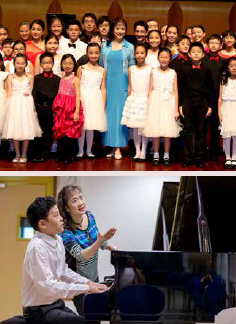 “I don’t understand why these certificates are more important than a bachelor’s degree or even a PhD degree that they will receive when they graduate from conservatories? Whoever has heard of a musician being asked ‘Do you have an O- or A-level certificate?’” lamented Madam Fang. “I don’t understand why these certificates are more important than a bachelor’s degree or even a PhD degree that they will receive when they graduate from conservatories? Whoever has heard of a musician being asked ‘Do you have an O- or A-level certificate?’” lamented Madam Fang.
Drawing parallels between sports and the performing arts, she explained that the best time to develop the musical talents of children is when they are 18 years old but that there are many obstacles preventing that from happening, such as the mandatory National Service for males in Singapore. Madam Fang pointed out that countries that have compulsory military conscription are still able to produce world-class acts because their system allows for flexibility. She, however, still hopes that Singapore can have its very own Lang Lang — an accomplished Chinese concert pianist — in future.
Nevertheless, Madam Fang is proud of her students as their musical training has made them more resilient and able to take on different challenges in life, and they consequently would be useful people in society.
“That’s what makes it all worth it. I’m just one of the many stepping stones in their lives to a brighter future. Although it’s a long journey, I’ll not stop. NAFA’s my home and the School is my baby,” said the dedicated educator.
|